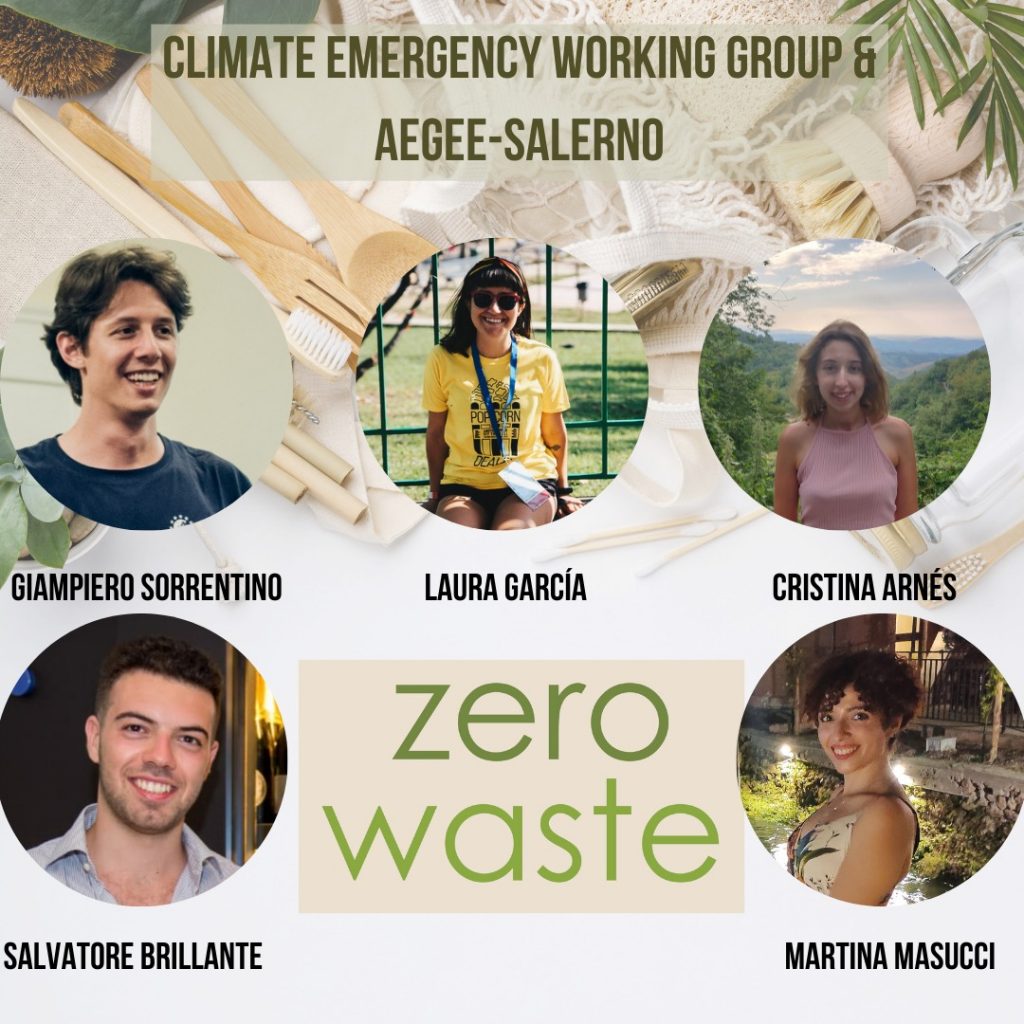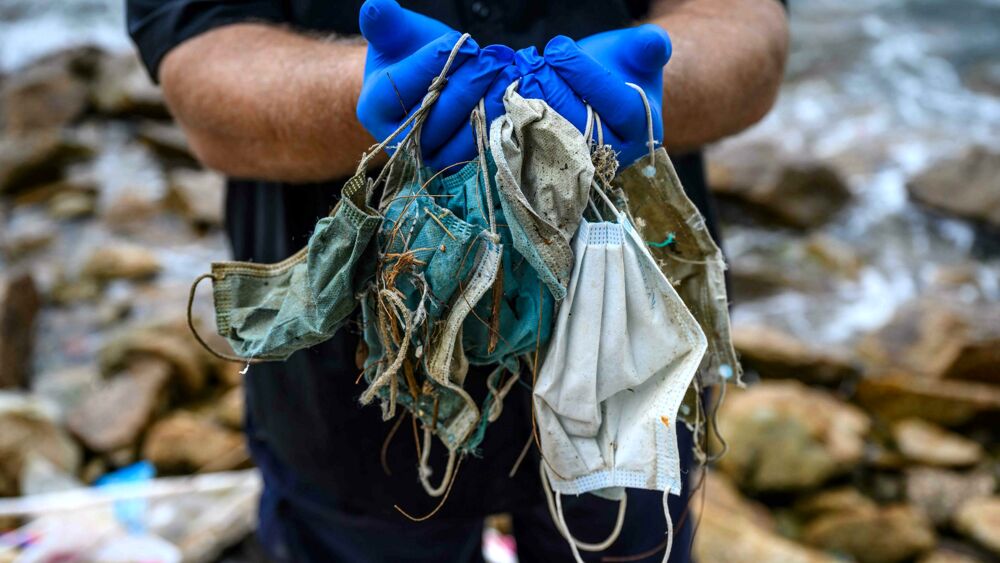Humanity must face the waste problem which nowadays has reached drastic importance, requiring acting quickly and incisively. Too much waste thrown into the sea or land improperly is returning to everyday life through food and water, such as microplastics. Not to mention the animals that die from ingesting waste, like whales, with kilos and kilos of garbage in their stomachs. In essence, humanity has generated a real environmental catastrophe. Many actions have been created to cope with this phenomenon, such as the Zero Waste movement which deals with minimizing the production of waste up to complete reuse, recycling, and enhancement. AEGEE welcomed this movement, to the point of investing antennas and working groups to be part of the change. We interviewed the guys from the Climate Emergency Working Group, let us find out what they think!

How and when was the Zero Waste campaign project born?
The idea came from our friends from AEGEE-Salerno and in particular from Martina Masucci, as a Board Member of this wonderful antenna. Martina was very interested in the issue of Zero Waste, as she was aware of the importance of raising awareness of all young people, intending to increase awareness of waste, especially in Italy where the issue is very much felt, as there is the need to enhance the territory, considering the incredible biodiversity and nature available to it. It is in the center of the Mediterranean Sea, a focal point for the success of the ecosystem. Thus, Martina of AEGEE-Salerno and the Climate Emergency Working Group of AEGEE-Europe have brainstormed on the project and on how to carry it out.
In this initiative, have you had feedback on the usefulness of your project. Can you give us some examples?
From the first month of the Climate Emergency Working Group, we have been puzzling to find a “fanciful” way to spread Zero Waste good practices and see them applied at least within our Network. An example was the call to the “Greenest Antenna” to which the magnificent members of AEGEE-Brescia responded, winning the title of Greenest Antenna of October thanks to the commitment they dedicated in the days in which they freed the city parks from waste left by the uncivilized.
Portal and social networks, how useful are they for spreading Zero Waste good practices?
Extremely useful, Zero Waste good practices are often not taught in school, so the best way to reach people is through social media. Reading a post costs little time, but you can learn simple gestures that may not come spontaneously, guided by old practices that are now a habit to be eradicated.
At what age did you start committing yourself to the environment?
Each of us in the Climate Emergency Working Group has begun to approach the protection of the environment for different reasons at different ages. For example, Cristina, of AEGEE-Madrid, from an early age was informed of small daily actions effective to protect the environment, such as not wasting water, or for Giampiero, of AEGEE-Napoli, who from the dream of designing self-sufficient buildings from the point of from an energetic point of view he has come to want to move in everyday life and make it a lifestyle. We all have one point in common, in fact, once we grew up, thanks to AEGEE, we had the opportunity to continue with this commitment and learn more and more. For us, it is now a lifestyle!
What are the first difficulties you have encountered in your path in practicing this lifestyle?
Plastic, plastic and plastic. It is daunting and impressive to see so many products with plastic, especially single-use ones. Its impact is very negative, and it is everywhere, as it is mainly used for packaging. Plastic is so easy to obtain that unfortunately people do not value it and do not realize that a simple gesture, such as recycling, can make a difference. So, the most difficult part is to convince people about how much they can do with small gestures.
It seems like a battle against windmills, maybe even governments could do more, beyond what we can do individually. What do you think about it?
They are both fundamental but let us remember that the government and any political party are nothing more than a small-scale representation of citizens’ thinking and as such, it moves according to what the majority makes to hear. If each person changed their habits personally, we would be able not only to protect the planet, but also to appeal to politicians and governments, but also to companies. Because, in fact, we are in dire need of government measures and it is thanks to an ever-growing awareness of people that the situation is starting to change, finding ourselves in the current green transition. Just think of the greener products that we find at the supermarket, well these arise from the customer’s need, who begins to demand more respect for the environment, or the elimination of subsidies for fossil fuels in favor of those for renewable energy. We are all part of the system!
Would you say, from your experience, that people are changing their habits and thinking more about sustainability in their daily life?
We answer with an optimistic yes! Especially young people, from the generation of Greta Thunberg to ours of AEGEE, you can see an awareness but also a growing concern, sometimes even overwhelming. There is no Planet B! Many young people are changing their habits such as reducing the use of plastic or becoming vegetarians and vegans.
How much do you think the masks, sanitizers, and other medical devices that we are required to use can negatively affect the environment?
Unfortunately, a lot… For example, we can already see many masks thrown away improperly. What has affected a lot has been the fear that people had and still have about this threat to our health. Just think of the disposable gloves used in public places … a great waste, senseless, which does not exclude the possibility of being infected in any case. As we know, COVID is not transmitted through skin contact, so why wear gloves? Just do not touch your face or eyes, instead of using gloves which will inevitably contribute to the increase of waste. If the first quarantine showed us how our planet breathes without our emissions, the next situation turned into a catastrophe, worsening the initial situation.

Today we hear a lot and above all about what pollution causes to the environment, but in your opinion, how serious can the effects of pollution be on our body?
Unfortunately, the effect is not small, and it will get worse and worse. For now, those who pay the consequences are the most fragile people such as the elderly, children and those who suffer from various diseases such as respiratory diseases. According to an estimate by the World Health Organization (WHO), every year 3.7 million people worldwide die because of prolonged exposure, mainly in outdoor environments. In this case, the phenomenon also affects the countries of Western Europe, the United States and Australia, as well as low-income countries. To make you understand what pollution is capable of, we report a serious event that occurred in 1952 in London. At that time, due to a thermal inversion in the atmosphere, the English capital was shrouded in a dense fog of smog for four days, which led to tragic consequences. According to medical services, there were approximately 4,500 more deaths in the first week after the incident. From December 1952 to March 1953, there were over 13,500 more deaths than normal.
Do you think the production of drugs is safe for the environment?
Keeping in mind that the pharmaceutical industries are required to purify and treat the waste generated, the demand gives light to a new type of pollutant that we must consider. I am referring to the residues of drugs that our body expels, such as dicoflenac, an anti-inflammatory that is often used by humans. The residues found in the urine convey into the sewer and subsequently into the treatment plants, which do not all have sufficient technology to remove them from the wastewater. Also due to the lack of legislation on drug pollution, the consequence is that aquatic fauna has repercussions due to this substance, especially in the context of reproduction. The problem must therefore be mitigated and solved both through the new technologies and regulations that are coming into play in the field of wastewater treatment and through conscious and intelligent use of drugs.
Sources
- https://www.mdpi.com/1996-1944/13/18/3964
- https://www.euro.who.int/en/health-topics/environment-and-health/air-quality/publications/2013/review-of-evidence-on-health-aspects-of-air-pollution-revihaap-project-final-technical-report

